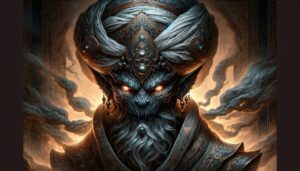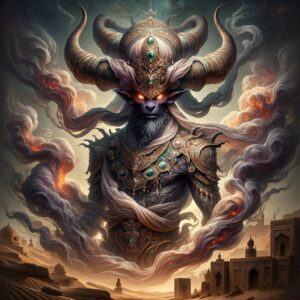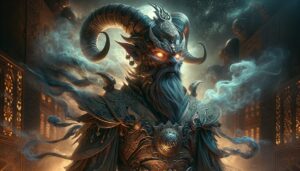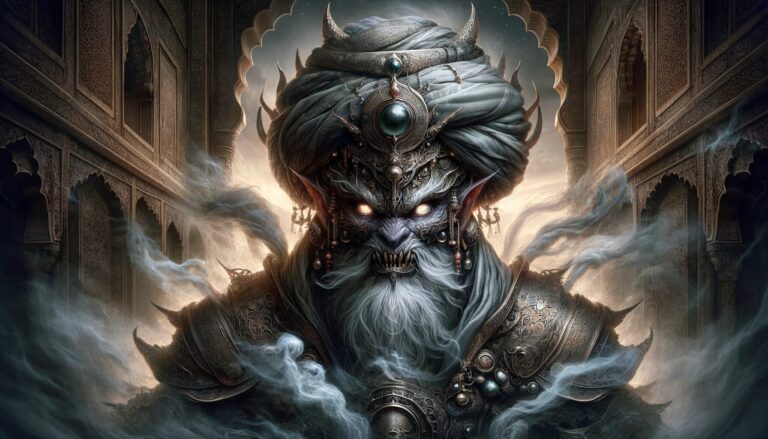Table of Contents
Jinn, also known as “djinn” or “genies” in popular culture, manifest as supernatural beings or spirits in Islamic mythology and Middle Eastern folklore. Typically, artists depict them as entities composed of smokeless or scorching fire, endowed with free will, and inhabiting a world parallel to that of humans. Jinn exhibit a wide range of behaviors, as their nature allows them to choose between good and evil.
Origins

Islamic mythology links the origin of jinn to their creation by Allah, the singular God in Islam. Allah counts jinn among His three principal creations, along with humans and angels. Unlike humans, formed from clay or dust, and angels, created from light, Allah fashioned jinn from a smokeless or scorching fire. This unique origin, mentioned in the Quran’s Surah Al-Hijr (15:27), distinguishes jinn from humans and angels in Islamic theology.
Jinn, akin to humans, bear accountability for their actions and exercise free will. This autonomy allows them to choose between right and wrong and to follow any faith or belief system. This characteristic differentiates them from angels, who solely obey Allah without free will.
Despite their supernatural essence, he share a common purpose with humans: to worship and serve Allah. They can be either Muslims or non-Muslims, and their actions and choices determine their spiritual standing and afterlife outcomes, paralleling human experiences.
Appearance

According to Islamic mythology and Middle Eastern folklore, vary significantly, with common abilities to shape-shift and become invisible. While often invisible, enabling them to elude human detection, jinn also demonstrate remarkable shape-shifting abilities. They can assume forms such as animals, humans, or objects, often featuring fire-like characteristics in their true form. When appearing human-like, jinn may exhibit unique, sometimes otherworldly, eyes and humanoid features. Additionally, they can adopt animal forms or appear with wings, exhibiting various otherworldly traits depending on cultural interpretations.
Abilities
Jinn hold a range of supernatural abilities that set them apart from humans, contributing to their mystical nature. Their powers include invisibility, shape-shifting, flight, teleportation, superhuman strength, and the ability to possess or control human minds and emotions. They can also communicate telepathically, create illusions, and manipulate weather.
Did Humans Interact with Jinn?

Although the majority of humans couldn’t see Jinn (unless the Jinn chose to reveal themselves), a few notable figures in history possessed the ability to communicate with these creatures. Islamic tradition teaches us that not only was Muhammad, the last prophet of Allah, sent to human communities, but he was also sent to the Jinn. Additionally, other prophets and messengers were dispatched to Jinn communities to acquaint them with Allah and offer them salvation. Surah 72 in the Quran dedicates itself to explaining the existence of Jinn on Earth and introduces Iblis, the Islamic counterpart of Satan, believed to be a Jinn.
Another significant figure in Islamic and Christian traditions, King Solomon, interacted with the Jinn. King Solomon, who ruled over ancient Israel and was renowned for his wisdom, was also considered a prophet with the ability to communicate with animals and Jinn. Beyond conversing with Jinn, King Solomon possessed the power to control rebellious Jinn. Legend has it that this ability enabled him to compel rebellious Jinn to construct the First Temple and acquire knowledge of remedies for illnesses caused by Jinn afflictions in humans.
The Tale of the Jinni and the Fisherman

Once upon a time in a bustling coastal town, there lived a poor fisherman named Ali. Ali was known far and wide for his honesty and kindness. One day, while casting his net into the sea, he pulled up a heavy, sealed brass jar. Curious, he opened it, and to his astonishment, a cloud of smoke billowed out, forming into a fearsome jinni.
A powerful sorcerer had trapped the jinni, named Mustafa, in the jar for a thousand years as punishment for his mischievous deeds. Mustafa, grateful for his release, promised to grant Ali three wishes as a reward. However, there was a catch – Mustafa explained that Ali would need to make specific and carefully worded wishes, as jinn were known for their clever interpretations of wishes.
Ali thought long and hard about his wishes. For his first wish, he asked for a beautiful palace filled with riches. Mustafa immediately transported Ali to a magnificent palace, surrounded by unimaginable wealth. However, Ali soon realized that the palace was in a remote desert, and he had no way to return to his beloved coastal town.
For his second wish, Ali asked to be returned to his home. Mustafa granted this wish, but he placed Ali back at his humble fishing shack, penniless and without the palace and riches.
Ali learned from his past mistakes and decided to use his third and final wish wisely. He wished for contentment, happiness, and wisdom to guide him through life. Mustafa granted this wish with a smile and then disappeared forever.
From that day on, Ali lived a simple but joyful life. He became renowned not for his wealth but for his wisdom and inner peace, and he shared his knowledge with others. His story served as a cautionary tale about the importance of choosing wishes wisely and finding true happiness within oneself, rather than through material wealth.
Types of Jinn

Marid is one of the most powerful and rebellious types of Jinn. People often depict them as large and imposing beings, and they are notorious for their stubborn and disobedient nature.
Ifrit, on the other hand, represents another powerful and malevolent type of Jinn. They have a strong association with fire and are renowned for their cunning and deceptive abilities. Ifrits tend to be more dangerous and hostile compared to other Jinn types.
Silat Jinn excel in stealth and invisibility. They have a reputation as spies among the Jinn, adept at discreetly gathering information.
Ghouls are closely associated with graveyards and are believed to feast on the flesh of the dead. They are often depicted as grotesque and sinister beings.
Jann, on the other hand, closely link themselves to nature. They maintain strong associations with deserts, forests, and remote places. Some consider Jann as protective spirits, while others attribute mischievous tendencies to them.
Unique creatures, Nasnas, embody a hybrid nature, being half-human and half-Jinn. Belief holds that their peculiar appearance results from the union between a human and a Jinn, often resulting in a distorted and unnatural physical form.
Shaitans, infamous for their inclination toward evil and temptation, frequently find themselves associated with leading humans astray and are considered malevolent spirits.
Hinn possess the believed ability to shape-shift, taking on various forms. Their notoriety lies in their capacity to mimic the appearance of loved ones, deceiving and causing harm to humans.
FAQ
Are jinn good or evil?
Jinn can be good, evil, or neutral, just like humans. Their nature varies, and not all jinn are malevolent.
How do jinn interact with humans?
Jinn can interact with humans in various ways, such as possession, granting wishes (if summoned), or simply observing human life.
Can jinn be seen?
Jinn are typically invisible, but they can choose to appear in various forms, including humans or animals.
What is the role of jinn in Islamic tradition?
In Islamic tradition, jinn are considered a part of God's creation and are subject to judgment like humans. They have free will and can be righteous or sinful.
Can jinn possess humans?
Yes, some believe that jinn can possess humans, leading to various physical or mental issues. Exorcism is sometimes performed to remove them.
How can one protect themselves from harmful jinn?
Protection can include reciting specific verses from the Quran, seeking refuge in God, or maintaining personal hygiene and cleanliness.
Are there different types of jinn?
Yes, there are different types of jinn, including Marid, Ifrit, Silat, Ghoul, Jann, Nasnas, Shaitan, and Hinn, each with unique characteristics and abilities.
Can humans make deals or wishes with jinn?
Some believe it's possible to make deals or wishes with jinn through rituals or summoning, but it's generally discouraged due to potential risks.




